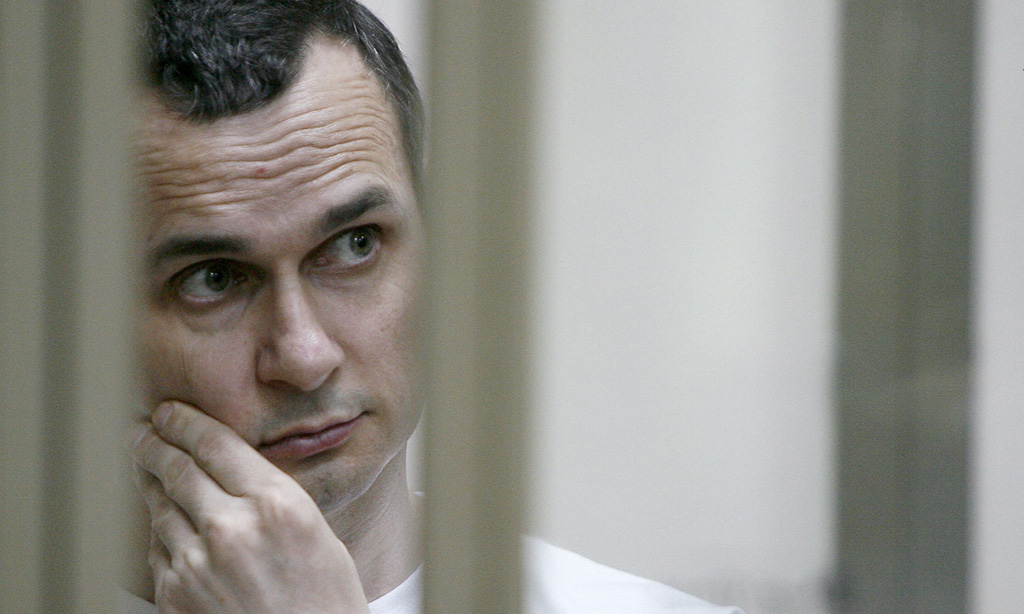The Sakharov Prize for Freedom of Thought, named in honour of the Soviet physicist and political dissident Andrei Sakharov, has been awarded annually since 1988 to individuals, groups of people and organizations defending human rights and fundamental freedoms. The first prize was awarded jointly to South African Nelson Mandela and Russian Anatoly Marchenko, but also to Bangladeshi author Taslima Nasrin, former Secretary-General of the United Nations Kofi Annan, Iranian director and activists Jafar Panahi and Nasrin Sotoudeh…
We mentioned it in this news, Congolese gynecologist Denis Mukwege won the Sakharov Prize in 2014. He is the founder and medical director of Panzi Hospital in Bukavu specialized in the treatment of women and children who have been raped by armed rebels. A year later, jailed Saudi Arabian writer and activist Raif Badawi (read our news about him here) was awarded Sakharov Prize.
Today, the EU has awarded the 2018 Sakharov Prize to Ukrainian filmmaker Oleg Sentsov. From Crimea, he was sentenced 20 years in prison by a Russian court for “plotting acts of terrorism” in 2015. The European Parliament’s President Antonio Tajani announced the winner and declared:
Through his courage and determination, by putting his life in danger, the film maker Oleg Sentsov has become a symbol of the struggle for the release of political prisoners held in Russia and around the world. By awarding him the Sakharov Prize, the European Parliament is expressing its solidarity with him and his cause. We ask that he be released immediately. His struggle reminds us that it is our duty to defend human rights everywhere in the world and in all circumstances.
European Media Director for Human Rights Watch, Andrew Stroehlein tweeted:
Oleg Sentsov, Ukrainian filmmaker & activist unjustly jailed in Russia, has just won the #SakharovPrize2018, the European Parliament's award for freedom of thought: https://t.co/oveAp1mUWx
His imprisonment evokes a dark page of Soviet history: https://t.co/S6l38P1HpR pic.twitter.com/yEdq25YVkT
— Andrew Stroehlein (@astroehlein) October 25, 2018
In this article about Oleg Sentsov’s hunger strike published in The Moscow Times in September, Russian Researcher Yulia Gorbunova wrote:
Today is day 117 of Sentsov’s hunger strike. The condition of someone existing without food for that long is horrifying to imagine. 117 is also the number of days that Anatoly Marchenko, a Soviet dissident, spent on a hunger strike in 1986 to demand the release of all political prisoners in the Soviet Union. Marchenko was force-fed during most of his hunger strike through a tube in his stomach, an experience he described in his letters as pure torture. He died from heart failure a little under two weeks after he ended the hunger strike. Many believe that Marchenko’s death was a decisive factor in pushing Mikhail Gorbachev to start releasing Soviet prisoners held on politically motivated charges.
Sentsov was sentenced by a Russian court to 20 years in prison in an unfair, politicized trial in 2015. An outspoken critic of Russia’s actions in Crimea, he was arrested on bogus terrorism charges in late spring of 2014, three months after Russian soldiers descended upon the peninsula. He is serving his sentence in a penal colony in Russia’s far north, above the Arctic circle. He is 42. He has two young children, who live in Crimea with his mother. Sentsov started his hunger strike one month before the 2018 World Cup, hosted by Russia in June and July. He is calling on the Russian authorities to release over 60 Ukrainians held in Russia and Crimea on politically motivated charges. He is not asking for his own release.
Oleg Sentsov ended his hunger strike on 5 October due to health concerns and the threat of force-feeding Gorbunova mentioned in her article. Many think it may already had caused irreversible damage. Sentsov remains in a dire situation and Olha Mukha, a coordinator for PEN International Congress, who defend freedom of expression worldwide, said the prize will give Sentsov “another status“, explaining: “It could be a very strong argument in diplomatic and political conversations to save his life.” The Ukrainian president, Petro Poroshenko, said that he hoped the award would hasten Sentsov’s release.
This 2018 Sakharov Prize is an important one as it marks the 30th anniversary of the prize. Five Sakharov laureates were subsequently awarded the Nobel Peace Prize: Nelson Mandela, Aung San Suu Kyi, Malala Yousafzai, and of course Denis Mukwege and Nadia Murad.
No immediate reaction from the Kremlin, as Vladimir Putin has showed no indication that he plans to hand Sentsov back to Ukraine. Maybe drawing attention to the imprisoned political prisoner will make things move before the prize is presented in a ceremony in the Parliament in Strasbourg, France on Dec. 12.










